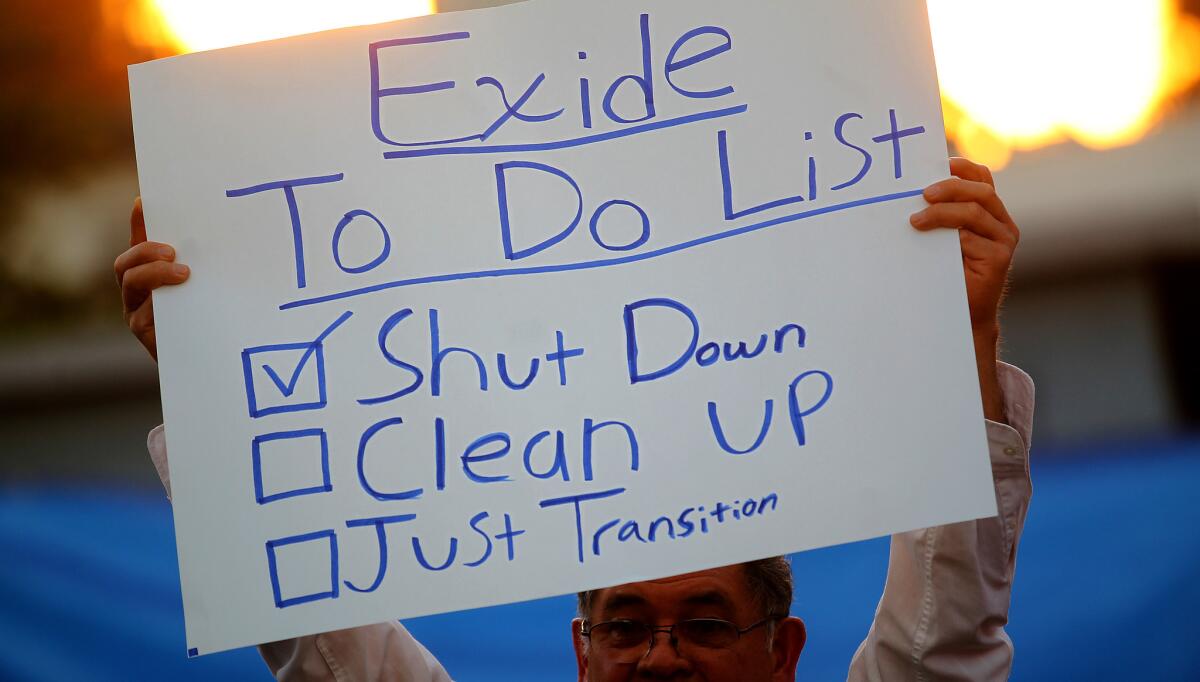L.A. councilman joins calls to speed up toxic cleanup around Exide plant

On Friday, community members and activists gather in the backyard of a home east of downtown Los Angeles to mark the shuttering of the Exide Technologies battery plant in nearby Vernon last year.
- Share via
Los Angeles City Councilman Jose Huizar urged state officials Friday to accelerate the removal of toxic lead contamination surrounding a shuttered battery recycling plant in nearby Vernon, saying he was astounded that the state agency overseeing the testing and cleanup of up to 10,000 homes had not acted more swiftly.
“Our residents are in danger of toxic contamination -- yet the state goes at a snail’s pace to do anything about this,” Huizar said at a news conference at City Hall.
Huizar, who lives in Boyle Heights and represents the area, said the California Department of Toxic Substances Control had failed to clearly address how quickly the cleanup surrounding the Exide Technologies plant would happen or where all the money for the cleanup would come from.
Last March, the Vernon facility agreed to permanently shut down in a deal with the U.S. attorney’s office that allowed Exide to avoid criminal charges even as it admitted to years of criminal conduct.
Before it was shuttered, the Exide plant had been repeatedly cited for violating hazardous waste laws and emitting too much lead and arsenic, yet state regulators had allowed it to operate for decades without a full permit.
In a resolution introduced Friday, Huizar called for Gov. Jerry Brown or the Legislature to take swift action to ensure that the state agency had a fully funded plan to test and quickly clean the homes surrounding the Vernon plant. Huizar said he had little faith that Exide, which had gone into bankruptcy when it struck its deal with the U.S. attorney’s office, would pony up the money it needed.
Huizar also introduced a proposal Friday at City Hall calling on City Atty. Mike Feuer to investigate whether the city could go to court if the state agency fails to speed up its efforts.
L.A. “should not be at odds with the state agency responsible for protecting the environmental well-being of the citizens of California,” Huizar said. “Unfortunately, it has come to that point.”
In reaction, Jim Marxen, deputy director of communications for the Department of Toxic Substances Control, issued a statement Friday saying that “the [Brown] administration continues to make the cleanup of contamination created by Exide Technologies a top priority.”
“We are committed to protecting the community and are currently working on a comprehensive plan that will include more resources to expedite our ongoing testing and cleanup,” Marxen said.
So far, roughly 200 of the up to 10,000 homes estimated to potentially have been affected by the contamination have been cleaned up, at an average cost of about $45,000 per home, according to the state agency. More than 10,000 tons of contaminated soil have been removed.
Exide provided $9 million to clean up homes and the state added $7 million last year. County supervisors also earmarked an additional $2 million last fall to do their own soil testing and reach out to residents. And Huizar said Friday that the city is currently examining how its public parks and rights-of-way have been affected and assessing what city funding is available to test them for contamination.
State and county politicians, including State Assembly Speaker-Elect Anthony Rendon (D-Lakewood) and L.A. County Supervisor Hilda Solis, have also pushed for a more urgent response. Some state lawmakers are pressing for $70 million in state funding next year to accelerate the cleanup efforts.
As Boyle Heights families wait for their homes to be cleaned, some have complained that state officials have seemed to react more quickly to the massive gas leak near Porter Ranch -- a wealthier community -- than the crisis in their largely Latino, lower-income neighborhood.
“It makes no sense why we are allowed to die ... and nothing has been done,” said Terry Gonzalez-Cano, a lifelong resident of Boyle Heights who said cancer and other illnesses had afflicted both of her parents, now deceased, her brother, friends and neighbors. “Don’t us minorities matter? Don’t our lives matter?”
Exide representatives did not immediately provide comment Friday on the proposal by Huizar.
Follow @latimesemily on Twitter for what’s happening at Los Angeles City Hall.
ALSO
Road to recovery begins in Porter Ranch as gas leak is halted at last
Lawsuit contends the California bullet train project is violating state law
‘Bay Boys’ surfer gang cannot block access to upscale beach, Coastal Commission says
More to Read
Sign up for Essential California
The most important California stories and recommendations in your inbox every morning.
You may occasionally receive promotional content from the Los Angeles Times.














